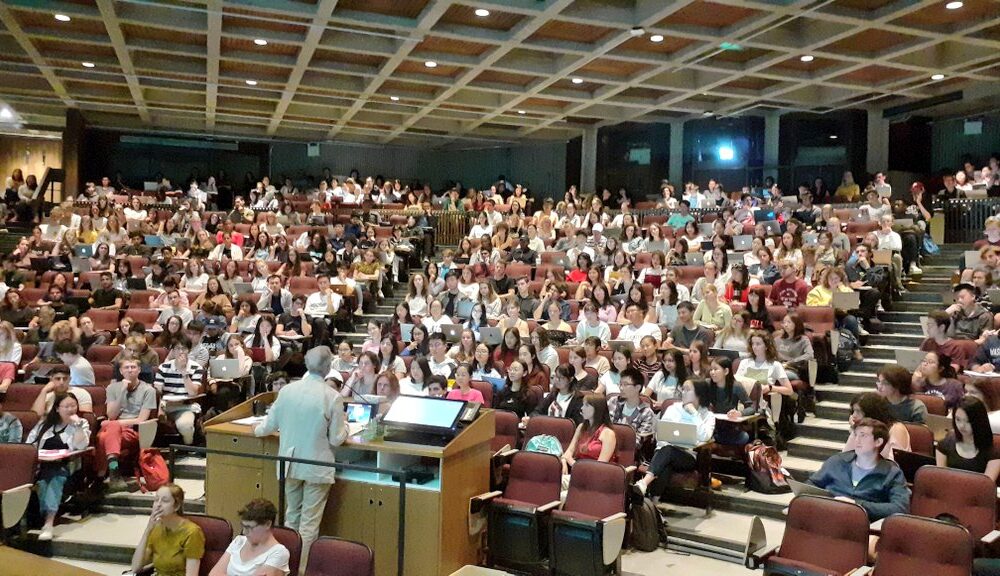Canadians have been calling for reform in higher education for years because many feel that such institutions fail to effectively prepare students for the workforce. This isn’t the only issue on students’ minds though—the university’s priorities are, too. From recycled class lectures, rotating professors, and the struggles with contacting lecturers, students feel the very real effects of McGill’s duelling priorities: Teaching and research.
Students may prefer to blame professors for this imbalance rather than the systems that create them. Out of 101 responses received on a recent poll posted to The Tribune Instagram asking McGill students whether they felt prioritized by their professors, over half responded that they did not. However, conflating professors’ priorities with McGill’s would be misleading given faculty are often just as frustrated with the system as students.
When a professor is hired at McGill, the university has a number of expectations for them, such as teaching, research, and departmental service work. Balancing these tasks can be a momentous undertaking for professors, especially when maintaining a life outside of academia. In an interview with The Tribune, professor Nikolas Provatas, from McGill’s Department of Physics, shared his experience managing these responsibilities.
“I put a lot of time into my teaching. I put hundreds of hours into making animated slides, ordering them, rewording them, continuously, so that explanations are refined and perfected. So that takes up a huge amount of my year,” Provatas said.
Provatas was also clear that his teaching and research goals are not separate. First, he has several graduate students, each of which he devotes several hours a week to. The graduate students, in turn, help him research and write papers that contribute to Provatas’ ability to meet research responsibilities.
“I spend at least two full days a week, top to bottom […] where I just sit with my research group,” Provatas said. “They’re still trying to learn, but it’s in a different format. And that’s my ‘research.’”
According to Provatas, this is how the “big six” research universities in Canada work. Together, professors and graduate students form the base of knowledge diffusion and discovery at McGill and other research institutions. For Provatas, teaching and research are well-integrated but, at the same time, balancing these responsibilities can prove to be a tricky test of patience.
“My wife’s not happy that on Thursday-Fridays, I don’t get home till 10:00 [p.m.]. I’m eating supper at 11,” Provatas said. “I’m clearly not always there for my family.”
This isn’t necessarily abnormal, either: The average workweek for professors is about 48 hours, with 14 per cent reporting working over 60 hours a week compared to the average Canadian’s (25 and up) 40 hours a week.
“It’s exhausting some days. I feel like quitting. I feel like it’s too much […] Some days, I just feel like saying, you know, ‘who can I call?’” Provatas said.
Provatas believes that, although the intense research and administrative tasks required of many professors may make their job difficult, professors have a genuine desire to teach.
“I think, in physics, people really enjoy [teaching] their craft. Because I think it really is entertaining and inspiring,” Provatas said.
Not all students are satisfied, though. In an interview with the The Tribune, Cypress Zufferli, U0 Arts and Science, explained that in his experience, it feels like there is a wide gap between student engagement in Arts classes versus Science courses at McGill.
“I think I prefer the Arts side in terms of teaching,” Zufferli said. “Even if they’re only just a couple hundred [people] smaller, I feel like it’s noticeable because the professors just seem to care more about the subject.”
For the professors who may not have as much dedication to their teaching, Provatas has an explanation. McGill’s tenure review requirements necessitate work in three categories, namely research, teaching, and service, which Provatas calls administration. These obligations are required of both tenure-track and tenured professors, albeit to varying degrees. However, Provatas stated McGill prioritizes research in this review.
A 2018 survey of nearly 3,000 professors throughout Canada found that only 17 per cent preferred research to teaching. So, if professors do not heavily favour research, why do students often feel like they are playing second fiddle to professors’ research projects?
“There’s one other thing we have to do: Write government grants to get funding to pay for those graduate students [.…] And that’s a very stressful and time-consuming task,” Provatas said. “So professors are heavily on the hook, and if they don’t succeed at meeting certain production metrics in their research, they won’t get funded anymore. Then the university will punish them doubly by viewing them as underperformers.”
According to Provatas, many of the larger research universities in Canada, including McGill, also punish professors for poor student performance or negative feedback. This especially affects women and instructors of colour, whose feedback is often tainted by sexist and racist bias.
Compounding poor teaching performances is poor research—however, for tenure-track professors, weak research comes with even higher stakes.
“If you’re up for tenure, you will be ranked based on teaching or research, but the research often has a huge impact if you screw up at it, because you can’t get any future grants, and so the university also suffers because you’re not bringing money in,” Provatas said. “If you don’t get grants to publish impactful papers in the first five years [of tenure-track], your career is essentially over.”
A number of courses also rotate professors. This is particularly prevalent in science, technology, engineering, and mathematics courses at McGill, with large undergraduate courses rotating through four or five professors. For example, BIOL 200, a large, primarily second-year course, has five instructors listed for the Fall semester. Transitioning in rapid succession from one lecturer to another, many of which have different ways of lecturing, organizing notes, and availability, can make it hard to keep up.
Professor Christopher Buddle, Associate Provost of Teaching and Academic Programs, told The Tribune that “the course may be subdivided into thematic areas for which different instructors have responsibility and relevant expertise.”
This does seem to link research and teaching more effectively, but it can feel disorienting, as Zufferli explained in a follow-up email to The Tribune.
“I do like the idea of having specific professors teach the subject they know best, but I do find the switch a bit jarring as the two profs have different teaching styles,” Zufferli wrote. “The nice part of it is having profs who are more interested in the subject.”
By maintaining the focus on integrating research and teaching, McGill’s administration often forgoes quality, leaving students to fend for themselves during transitions happening at almost breakneck speeds. At times, some students don’t even realize their professors have other responsibilities outside of teaching.
“With most of the research that my profs are doing, either they just don’t talk about it because it is out of our league, or when they do I’m like, ‘That’s really cool, but I understand nothing that you’ve said,’ so I can’t actually take anything away from the research that they’re doing,” Zufferli said. “I often actually forget that professors have to do research on the side.’”
Not only does this highlight the fact that research may not play as integral a role in student education as previously thought, but it also underlines the confusion around professors’ goals and responsibilities.
Research is a defining characteristic of a “research university,” but so is teaching, and it is getting the short shift. By recognizing that professors are, for the most part, on the students’ side, the frustration with professors’ seeming indifference can be shifted to the actual sources of students’ feelings of isolation: An administration that is not working hard enough to rectify the issues in student engagement and higher education.









